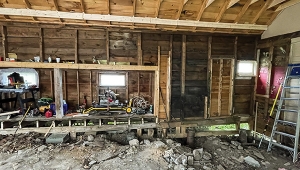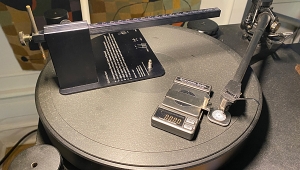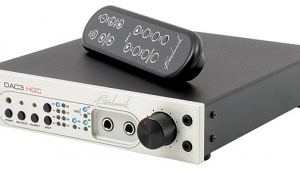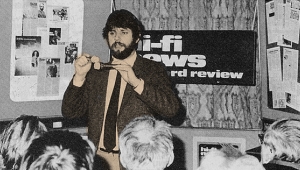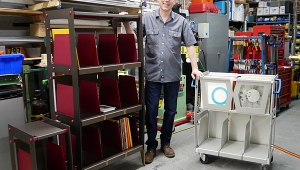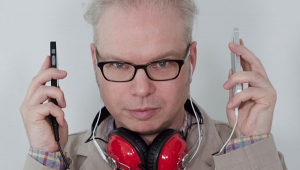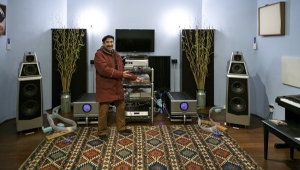| Columns Retired Columns & Blogs |
Sisters in Sound Kathy Gornik part 2
Guttenberg: Oh, before I forget to ask—are you an audiophile and a music-lover?
Gornik: Listening to and loving music is not the same as being an audiophile, but yes, I've become an audiophile, though that took some time. My interest in audio was first driven by the desire to own and operate a business.
Guttenberg: Which leads to my next question: Why aren't there more female audiophiles?
Gornik: I think it's because men relate to machines and mechanical things in ways that women do not. Steve, this is really treacherous territory, and I don't want to get into trouble here, but women don't relate to the "stuff" the way men do. Then again, it's not purely a gender-based phenomenon—I think there are a lot of guys out there who don't connect with the gear.
Guttenberg: It seems like the high-end market is moving inexorably toward home theater.
Gornik: Oh my, yes—the vast majority of our new customers are putting their Thiels in video systems. Our dealers told us they needed an on-wall speaker, and that provided Jim the impetus to develop our coaxial drivers—because that technology would maintain phase and time coherence for listeners scattered around the room. The PowerPoint on-wall speakers are our biggest sellers—we can't keep them in stock.
Guttenberg: The PowerPoint represented a major paradigm shift for a company that built its reputation producing large floorstanding loudspeakers. But your next project was a floorstanding design, the new CS1.6.
Gornik: With the SCS3, MCS1, PowerPoint, PowerPlane, and the SW1 sub, we completed a cycle of products targeted for home-theater-oriented buyers. We began this process about four and a half years ago, so Jim was ready to start working on a new floorstanding design. A lot of what he learned—and we learned, as a company—about reproducing the sound of movies, such as greater efficiency and output capabilities, will be applied to our next generation of floorstanding speakers. The CS1.6 is the first of the new breed.
Guttenberg: Kathy, the number of statement-level, $40,000-plus speakers on the market is going out of sight. Are you working on something?
Gornik: We've always tended to work at the conceptual stage with a cost-no-object approach, and we have developed some interesting ideas. But we've never utilized Jim's engineering skills for such a speaker because we prioritized more real-world products. It's fun to think about, though.
Guttenberg: Speaking of the real world, let's talk about your involvement with the Consumer Electronics Association.
Gornik: I serve on the Executive Board; it's volunteer work, but I really enjoy it. [It was announced in October that Gornik is to be the 2003 president of the CEA's Board of Directors.—Ed.] Gornik Trade associations are there to serve the interests of their industries. The people are terrific, and by being involved, I can influence the direction of the group.
Guttenberg: We should explain that the CEA is the organization that hosts the Consumer Electronics Show in Las Vegas each year. I've heard rumors about integrating the high-end displays with the mainstream manufacturers at the Las Vegas Convention Center.
Gornik: Oh, that sort of talk has been there forever, but no, we're going to stay with the separate venue at the Alexis Park Hotel. The high-end companies need rooms where they can make some semblance of good sound. Unfortunately, it's never ideal, but it's definitely better than it would be on the floor of the Convention Center. On the other hand, we in the High End need to reach beyond the specialist retailer base and connect with the more home-theater-oriented custom installers. Several high-end manufacturers are already on the main convention floor, bringing high-end to a wider audience. It's a win-win situation.
Guttenberg: So the CEA actually gives a hoot about the high-end industry?
Gornik: Oh yes, there's a high-end audio group...
Guttenberg: Which doesn't include any video manufacturers?
Gornik: No, just audio; video has a separate division. The high-end audio group has its own board and budget. I must say that the people from the bigger companies are great mentors and colleagues. The sense of camaraderie is fantastic. We're not competing against each other. No, we're up against second homes, vacations, cars—you name it.
Guttenberg: And that also applies to the Custom Electronic Design & Installation Association show. You now have a significant number of custom-installer dealers.
Gornik: Correct. The majority of our CEDIA dealers have showrooms, and more and more of them are embracing the value of doing demos. The showrooms also serve their own selling staff, because they get to listen for themselves and get excited about the products they sell. We're looking for custom installers who have some passion for good sound, but I'm afraid that's not the overarching force that drives that industry. That's a shame, because they have the opportunity to give their customers great sound. I suppose it's because they don't believe their customers care about such things.
Guttenberg: That's sad.
Gornik: Long ago, high-end dealers proved just the opposite—they can awaken that appreciation for music and film in their customers.
Guttenberg: I agree, but right here in New York City, I'd bet there are a significant number of folks living in multi-million-dollar apartments who went out and bought $10,000 plasma TVs—but they're probably listening to music over Bose systems. The disconnect between audio and video awareness is huge.
Gornik: And why is that?
Guttenberg: Ah, that's all part of the bigger question of why the two-channel segment of high-end still hasn't broken out of the niche market.
Gornik: Our industry is too focused on appealing to the technology enthusiasts as opposed to music-lovers. Our vocabulary and presentation exclude the wider public. I don't want to get into trouble again, but most high-end salespeople are men, and whether they mean to or not, they can be off-putting. High-end shops can be intimidating to the uninitiated. I think people want high-quality products, but they don't want to become the experts, they just need expert advice.
Guttenberg: We've got to arouse a passion for sound in the general public.
Gornik: I agree, we have to reach out and grab the souls of these people. When given the chance to live with great sound, most people come to appreciate what it adds to their lives. But this passion is difficult, if not impossible, to communicate on a showroom floor unless you have really astute salespeople who can demonstrate what great sound is all about.
Guttenberg: Amen!
- Log in or register to post comments
